- Home
- Belva Plain
Fortune's Hand Page 9
Fortune's Hand Read online
Page 9
“Of course I will.” He was eager. Enthusiasm ran through his veins.
Without being aware of it, so gradual were the steps, he was being fitted into a niche. It was a comfortable niche among old-time citizens who had for generations kept their respected places, living out their years in familiar neighborhoods, and although some few possessed great wealth, they made no display of it. They drove plain American cars and dressed plainly, darning the holes in their expensive old sweaters. Their names were prominent in the pursuit of good causes, to which they gave as lavishly as they could.
Jim Jasper, asking him to help with the hospital’s drive for a new wing, took him to a fund-raising dinner and gave him a list of names to solicit. Then someone from the law school’s alumni group invited him to become active.
“I recognized your name when you called me about the hospital,” he said.
Robb had never been deeply involved with religious affairs, but now, since Ellen and her father went regularly to services, he joined their church. When asked to replace a Sunday school teacher who had fallen ill, he agreed. In a secret way that he would have been embarrassed to express, he saw a deep connection between these compassionate teachings and his profession of the law.
One of the congregation’s leaders was also a leader in the city’s united charities appeal, and he encouraged Robb to work on the committee with him. So now, for the first time, his name appeared on a prestigious letterhead.
He was becoming a familiar figure. Yet often, on a Sunday afternoon, perhaps as they wheeled Julie in her stroller—the most expensive model in the shops, lined with white leather, a gift from Eddy Morse—it would still astonish him to be hailed by people on the other side of the street.
“Who are they?” Ellen would ask. “You seem to know everybody.”
Robb MacDaniel was a recognized citizen of the place that he had entered so few years before with an unknown name and his whole worldly wealth crammed into a rented car. And he was not yet thirty years old.
* * *
Often in fair weather, Ellen would take her sketching board and Julie’s toys into the park near the apartment. If ever Robb came home early—an exceedingly rare occurrence—and failed to find them home, he knew where they probably were. At the base of a hill in a grove of copper beeches, there was a group of benches where old men read their newspapers and young mothers watched their children. Whenever she could, Ellen liked to find a seat slightly apart where she might concentrate on her work. Behind them on the top of the hill, he could easily recognize them by the width of Ellen’s straw hat.
“I burn easily,” she had told him on that day in the coffee shop, to which she had lured him against his will. Imagine: against his will! And hastening down the hill, he thought that the only bad thing about the work he loved was the time it made them spend apart.
Julie saw him. Her chubby legs pumped the pedals of her tiny red tricycle as she raced. Tied with a red ribbon, her black curls bobbed. At once, he had to pick her up and kiss each cheek. They had a ritual.
“Three kisses. You forgot,” she would say.
“I didn’t forget.” And reaching into his pocket, he would present her with the single chocolate kiss that she was allowed each day.
Then, with a wicked look, she would demand another. “Three,” she would say, and knowing how impossible was the request, would laugh.
Ellen was in her third month of pregnancy. Matching her daughter, she wore white and held back her hair with a band of red ribbon.
“You have to look at Mommy’s picture,” Julie said.
It was a rough crayon sketch of robins huddled in snow, billows of it on the ground and clouds of it falling out of a somber sky.
Julie gave orders. “Mommy, read my story.”
“I haven’t written it yet. It’s still in my head.”
“Well, tell it again, Mommy.”
“Are you really doing a story?” asked Robb.
“I think so. This morning when Julie and I were watching some robins in the grass, I remembered once reading about robins who went north too early one year, or the snow came too late, and caught them in a blizzard. They were starving and freezing, and people captured as many as they could find, put them in an airplane, and flew them south where it was warm. Won’t that make a lovely children’s book? What do you think, Robb? Why should I always illustrate somebody else’s book?”
“I think it will be beautiful, and you shouldn’t,” he said, feeling such a tenderness for the eager face turned up to his, that it seemed he must be the happiest man in the world.
“Look,” Ellen said when they walked home together. “That’s Dad’s car in front of the house. I wonder why.…”
They had not long to wonder. “I’ve had something on my mind for a while,” said Wilson Grant, “and today on my way home it suddenly came to me that I should tell you about it right now. So I turned the car around and came here. It’s this: I want to make a trade with you, my house for the lease on this apartment, which is just the right size for me and will soon be too small for you, if it isn’t already.” And he looked around the living room toward the little hall where the tricycle stood with the stroller that Julie had just given up.
“Dad!” Ellen cried. “You love the house. The hemlock fence that you planted, your library with the fireplace—”
“That’s true, but there comes a time when what was is no more. I don’t have the strongest heart, as you know, and I’m thinking of taking things a little easier, more vacations and no more gardening. You people are starting out. The house will be perfect for you. You were born in it, Ellen. You grew up in it. And now your children can grow up in it.”
She looked away. Her father would not want her to witness his emotion. He had tried to hide it from her even when her mother died, and this, though of a very different degree and kind, was also an emotional moment. She was herself deeply moved. His heart must be far weaker than he wished to admit, and he was feeling the hovering imminence of death.
“The house, sir? I’m rather speechless.”
“Well, no speech is necessary, so that’s all right. It’s yours. Arthur doesn’t want it, doesn’t need it, and you folks do, with number two on the way and no doubt more to come. Ellen always said she wants four.”
“It’s hard to know how to say thank you for such a gift,” Robb said, and repeated, “such a gift.”
As often, Ellen read his mind. They had taken a ride once to Marchfield, and he had shown her where he grew up. This now is for him, she thought, what it would be for me to be given a mansion. Then, hastily, she amended that last: I do not belong in a mansion. I would hate it. But Robb does belong in our old house, with me. We will sleep in my parents’ room, in our same four-poster bed. The walls will be green, the soft color of new leaves. Julie’s room will be blue and white. The baby’s room—well, that depends. And in her chest she felt a delightful rise of anticipation.
“Of course you must know that you’ll be made a partner in the not-too-far-distant future,” her father was saying to Robb. “You’ve exceeded our expectations. Sam Taylor and Jim Jasper both have a high opinion of you, as you also must know. The way you handled the Hawthorne case last month, for instance, an acquittal that really was touch-and-go—everyone was impressed.”
“I was pretty nervous,” Robb said. “The first trial all on my own. I’ll tell you—I was afraid my mind would go blank and I’d make a fool of myself, a disgrace.”
“That’s natural. I had the same feelings my first few times. But you were up against a tough adversary, Robb, a man with a reputation. Frankly, I wouldn’t have made a bet in your favor.”
“I guess what got me through were my thoughts of that boy and his small theft. He’d never had a chance, with his wretched father and all the troubles. He didn’t deserve the punishment they were asking for. And he was depending on me.”
Yes, Ellen thought, he even looks like a man on whom people can depend. There is no mistaking him. People fe
el it. You can tell by the way they look at him, and ask things, and listen to his answers. I’ve seen it so often, and I have felt so proud every time, so lucky and proud.
In the final painting on the final page of Ellen’s book, a flock of robins had settled upon the grass and in the trees.
“Oh, that’s good,” Robb said. “You’ve done it, Ellen. I can almost hear them flutter and chirp.”
“I hope so. I’ve worked really hard to polish every word. They have to be simple enough for a child to understand, but they must be beautiful, too. Beautiful and simple, like a poem.”
“I don’t know what to say. I’m in awe of you, darling.”
“Wait! It hasn’t been published yet.”
“That’s Mommy’s book,” Julie said, interrupting importantly. “She wrote it all herself, Daddy. Now the poor birds are nice and warm again and they can eat. There’s no more bad snow.”
“Julie’s as excited as I am,” Ellen said. “But it’s after seven, and she needs to be in bed. Robb, will you take her, please? I don’t seem to have the energy today to climb the stairs.”
He looked at her, and they both laughed. It could be any time this week, the doctor had warned, and she mustn’t go far from home. She was feeling, and probably looking, like a melon ready to split open.
Ah, but life was good! Everything had gone smoothly through the spring and summer, her father’s move out of the house, and their move into it. This return to her home had been a reweaving, as if life were a seamless cloth on which, at intervals, new patterns emerged: first Robb, then Julie, and now still another appeared in the splendid cloth.
Otherwise, all was the same. Even Billy, growing sadly old, lay sleeping at her feet. The only thing that her father had removed from the house was the ancestral Confederate portrait, which was “to go to your brother in the male line of descent.” Between the windows, the Norfolk pine that her mother had nurtured from infancy now almost touched the ceiling with its graceful tip. Beyond the windows lay the autumn evening, pale yet gilded where the sun touched the oaks and the lawn. In one corner near a bed of late-blooming roses, stood a statue of some unidentified would-be classical goddess, half-naked and half-draped, holding a lute.
“Falling asleep?” asked Robb. “Why don’t you go upstairs and get comfortable in bed?”
“It’s too early. No, I was just resting, looking out at your friend Eddy’s awful statue, and laughing.”
“Don’t worry, we can find an inconspicuous yet tactful place to put the thing. It is pretty bad, isn’t it? But it’s so well meant. I’m sure it’s awfully expensive, too. Anything Eddy buys is expensive.”
“You do like him so much, don’t you?”
“I do. He’s fun to be with, and he’s genuinely good besides. You know that.”
She did not doubt the man’s goodness. Nor did she truly dislike him. But she was just as pleased not to see him too often. For this she sometimes scolded herself. Was she, heaven forbid, turning into some sort of narrow intellectual snob, withholding herself because his manner and tastes were not hers? Or not Robb’s either? No, that was not the reason. Definitely not. There was just something else.… Call it the usual “chemistry” in reverse. And very probably the feeling was mutual. He did not visit very often.
“I always wonder,” she said, “what made Eddy stay here instead of going to New York or Washington, where he has all those contacts he talks about?”
“The reason is that his biggest contact is here now. Richard Devlin’s made a final decision to keep his headquarters. He wants to run for the Senate someday after he’s made his fortune.”
“And Eddy’s going to make his own fortune?”
Robb shrugged. “Who knows? He takes a little piece of Devlin’s deals as they go along. He was telling me about it the other day when he dropped by for lunch. Well, he has money to play with.”
“How much of him do you get to see?”
“When he’s in town. Seems to me he spends most of his life on airplanes. But he enjoys it. Tell me how you’re feeling.”
“Well, at this point, I’ll confess I’ll be glad to get flat again. Glad to see the young one’s face.”
“It will be a wonderful face. A love child, as in the old wives’ tale. I wonder whether there’s any truth in that business about how you can tell when a child is the result of passionate love. It doesn’t sound scientific, but who knows? Maybe it’s true.”
When he knelt beside her chair, she took his face between her hands and kissed him.
“Maybe it is. Look at our Julie.”
“She’s my heart, my miniature Ellen.”
“Can you believe she’s in nursery school?”
“I wouldn’t be surprised to find her in kindergarten with the five-year-olds, she’s so bright.”
“Yes, but not one of those annoying, precocious brats parents like to show off.”
“She knows what she wants, though. She knows how to twinkle and charm, like you.”
“Did I really ‘twinkle’?”
“Not the first day. You merely looked me over carefully with your sea-green eyes, your mermaid’s eyes.”
A sudden pain ran through Ellen and emerged from her throat in a sharp cry. She grasped the arms of the chair to steady herself against the next pain.
“What is it? Are you all right?”
“I’m fine. But I don’t think it’s going to wait a week. I think it’s in more of a hurry.”
Robb went down the hospital steps to the walk, the same walk on which he and Ellen had once each pretended to be meeting by sheer coincidence. He was chuckling, both at that memory and at the fact of having a son in the nursery upstairs.
A son! After this one, he wouldn’t care about the sex of those who would follow. He had what he wanted now, a girl like Ellen, and a boy who—oh, modestly, he hoped—would be like himself, if only as a companion who liked what he liked. They would go hiking together, follow the baseball games, and talk about the world. The boy would be serious, but not too much so, just a bright, very decent, loving kid.
And now he was here, in his bassinet. “Penn,” Robb murmured, after his mother, Della Pennington. “Penn,” he said again. “My son, Penn.”
Then he remembered he ought to be handing out cigars. It was a funny custom. Why cigars? At his office, they all smoked cigarettes, except for his father-in-law, who smoked a pipe. Nevertheless, cigars would be expected, so he parked in front of a row of stores and went into the tobacco shop.
“Hey, what are you doing?” asked Eddy.
“As you see, buying cigars. Ellen’s just had a boy this noon.”
“Say, that’s great. What’s his name?”
“We’re calling him Penn. He’s a bruiser. Weighs eight pounds, eleven.”
“Looks like Ellen, I hope, for his sake.”
“Doesn’t look like anybody except a healthy baby. Bald, with chubby cheeks.”
“Well, congratulations. Come on in here and I’ll buy you a new tie to celebrate, I’m picking up a suit.”
“This place? Too expensive, Eddy. Too rich for my blood.”
They were standing before the window, where models wore Irish tweed jackets, Italian suits, and Scottish cashmere sweaters.
“Get in there. Can’t you at least let a fellow buy you a tie?”
And so Robb was propelled into the shop, obliged to accept with grace the gift of a handsome silk tie, and urged to “take a look” at the fit of Eddy’s new suit.
“Custom tailoring,” Eddy said. “You can always tell by the fit across the shoulders. Not a hair’s breadth of a wrinkle. You should try it.”
“I don’t care that much, Eddy. What’s a little wrinkle?”
“A lot, my friend. You owe it to yourself to look your best.”
In his euphoric mood, with the celebration cigars in his hand, Robb was irritated. Shoulders! Wrinkles! Foolishness! He was about to leave, when a man came in from the street and greeted him.
“Mr. MacDaniel, is
n’t it? Either he or his double.”
“Not his double, sir.”
“My name’s Trescott. Bob. Oh hello, Eddy. You two together?”
“We’re old friends, Robb and I, from the year one.”
“Well, I won’t intrude. Just want to say, Mr. MacDaniel, I was in court yesterday waiting to be called when I heard your argument. And I came away impressed. I mean impressed. You were eloquent. You had your opponent beaten before five minutes were up.”
“Thank you very much.”
“Bob’s at Lenihan, Burns and Fish,” Eddy explained.
Now it was Robb’s turn to be impressed, but since he was not particularly so, he merely showed a very pleasant expression and nodded.
A few more minutes having been spent while Eddy’s suit was wrapped, the two went out together.
“Nice guy,” Eddy remarked, “but an underling. Lacks drive. He’ll never rise, never make partner. I think he’s beginning to realize it, too.”
“That’s sad,” Robb said, meaning it. “That is, if he really wants to ‘rise.’ ”
“Well now, why wouldn’t he? Once you’re in a firm like that, you’ll want to be on top. Those big top firms work you like the devil anyway, whether you’re on top or bottom. I connect with all Dick’s lawyers, and they’re all the same. West Coast, East Coast, they’re all the same. But they sure rake it in! Especially with the real estate market and the construction going on everywhere. They rake it in.”
“I guess so,” Robb said.
They walked toward the parking lot. Julie was with the baby-sitter, who was staying while Ellen was in the hospital, and he was in a hurry to get home to her.
“Lenihan, Burns and Fish, that’s the kind of firm you should be in.”
“What?” With his hand on the car door, Robb halted. “Why should I? I’m doing very well where I am.”
“True, but you can’t make a comparison. Your Wilson Grant’s a throwback to other times. The scholarly country lawyer with his wills and trusts plus a handful of interesting cases that one good litigator like you can handle. There’s not a hell of a lot of money in it.”

 The Golden Cup
The Golden Cup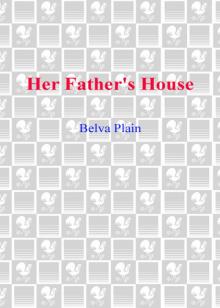 Her Father's House
Her Father's House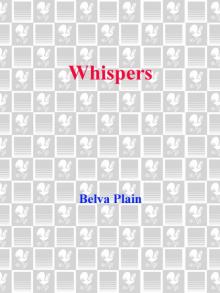 Whispers
Whispers Crescent City
Crescent City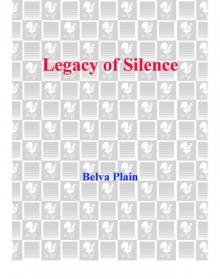 Legacy of Silence
Legacy of Silence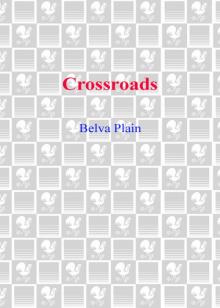 Crossroads
Crossroads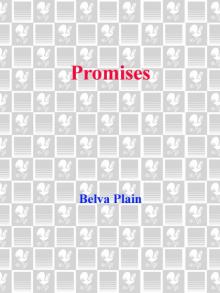 Promises
Promises After the Fire
After the Fire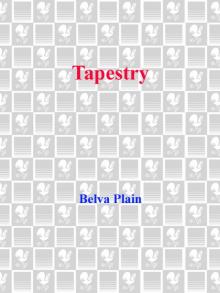 Tapestry
Tapestry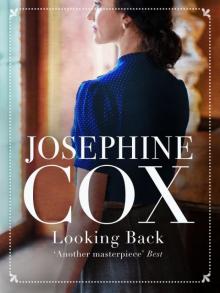 Looking Back
Looking Back Heartwood
Heartwood The Carousel
The Carousel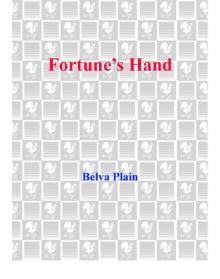 Fortune's Hand
Fortune's Hand Homecoming
Homecoming Random Winds
Random Winds Harvest
Harvest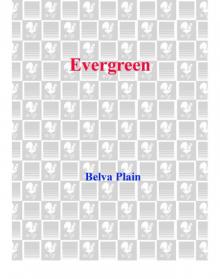 Evergreen
Evergreen Treasures
Treasures The Sight of the Stars
The Sight of the Stars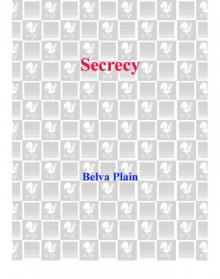 Secrecy
Secrecy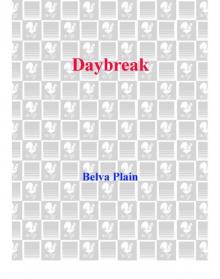 Daybreak
Daybreak Eden Burning
Eden Burning